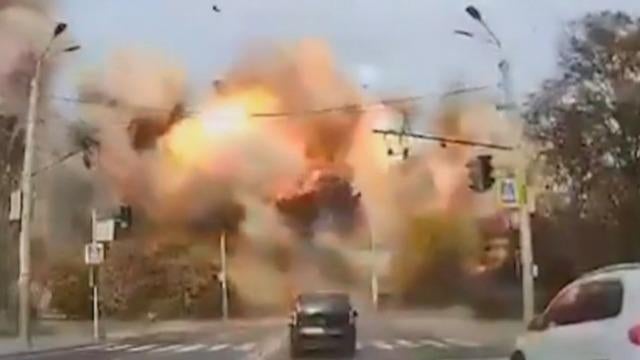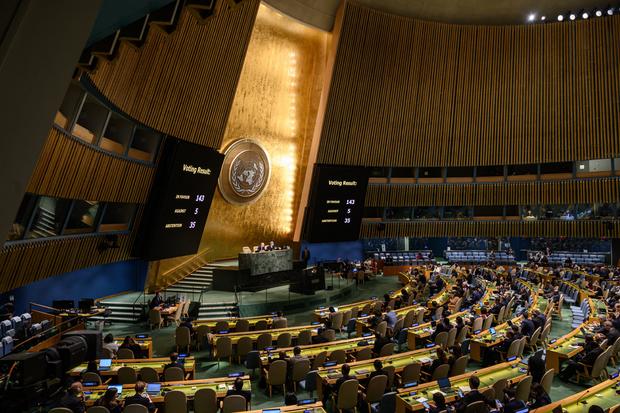▶ Watch Video: Russia escalates attacks after Crimea bridge blast
United Nations — The United Nations General Assembly Wednesday voted overwhelmingly to condemn Russia’s so-called annexation of a large swath of Ukraine, and demanded that Russia withdraw its troops from those areas. Saudi Arabia was among the nations who voted in favor of the resolution.
By a 143-5 margin, the General Assembly condemned Russia’s “attempted illegal annexation” of four Ukrainian territories, and called for Russia to “immediately, completely and unconditionally withdraw all of its military forces.”
The five nations who voted against the measure were Russia, Syria, Nicaragua, North Korea and Belarus. China was among 35 nations who abstained from voting.
The resolution, which also called on nations to “refrain from any action that might be interpreted as recognizing any such altered status,” marked the strongest support to date for Ukraine from the 193-nation General Assembly since the start of the Russian invasion.
President Biden, in a statement Wednesday night praising the vote, said “143 nations stood on the side of freedom, sovereignty, and territorial integrity.”
“The stakes of this conflict are clear to all — and the world has sent a clear message in response: Russia cannot erase a sovereign state from the map. Russia cannot change borders by force,” Biden’s statement read. “Russia cannot seize another country’s territory as its own. Ukraine is entitled to the same rights as every other sovereign country. It must be able to choose its own future, and its people must be able to live peacefully inside its internationally recognized borders.”
Linda Thomas-Greenfield, U.S. ambassador to U.N., told world leaders in General Assembly Hall that “our message is loud and clear: It does not matter if you as a nation are big or small, rich or poor, old or new. If you are a U.N. member state, your borders are your own and are protected by international law. The path to peace does not run through placations. The path to peace does not involve turning the other way in the face of these flagrant violations. Peace does not, and has never, come from silence.”
After the vote, Thomas-Greenfield told reporters it was a “monumental day,” and later tweeted, “Kherson is Ukraine. Zaporizhzhya is Ukraine. Donetsk is Ukraine. Luhansk is Ukraine,” referring to the territories that Russia now claims as its own.
Sergiy Kyslytsya, Ukraine’s U.N. ambassador, told CBS News the vote was a “collective effort of an overwhelming majority, and the call of moral duty and reason.”
“Who wants or can afford to be on the wrong side of the fence at this historic moment?” Kyslytsya asked.
On Oct. 5, Russian President Vladimir Putin signed laws annexing four Ukrainian regions in the wake of “referendums” staged by Moscow in the areas. Those referendums were condemned by the international community as shams, with Ukraine, the head of the U.N., the U.S. and many other countries dismissing the move as a blatantly illegal land grab.
“A trail of blood is left behind the Russian delegation when it enters the General Assembly,” Kyslytsya told the General Assembly Wednesday, referring to the brutality of attacks against civilians since the war began.
The vote was telling in how far the international community has come to send a unified message to Russia. All members of the Gulf Cooperation Council – which includes Bahrain, Kuwait, Oman, Qatar, Saudi Arabia, and the United Arab Emirates – voted in favor of the resolution.
Abdulaziz Alwasil, Saudi Arabia’s U.N. ambassador, said that the support for the measure comes out of a “commitment to the firm principles of international law and Charter of the United Nations … We confirm the need to respect the sovereignty of states with neighboring relationships.”
Prior to the vote, Vassily Nebenzia, Russia’s U.N. ambassador, warned that the measure could “destroy any and all efforts in favor of a diplomatic solution to the crisis.”
His caution was not heeded.
Following an Oct. 8 explosion which caused the partial collapse of a bridge linking Russia with the Crimean Peninsula, Russia launched two days of retaliatory strikes on Monday and Tuesday in which dozens of missiles and drones were fired at Ukraine. At least 19 people were killed and more than 100 injured. Russia on Wednesday announced that it had arrested eight people in connection with the explosion.
“The latest barrage of missile attacks against civilian infrastructure in Kyiv and cities that Russia now claims as its own through its sham referenda, reveal to us the true nature of this war,” Bob Rae, Canada’s U.N. ambassador, told the General Assembly Wednesday.
“This is not a “special military operation,” he added. “It is a war to punish and destroy Ukraine.”
Olof Skoog, European Union ambassador to the U.N., told reporters after the vote that “the result today is a resounding statement that rejects Russia’s actions and considers them illegal: the sham referenda, the alleged annexations, all of it. It proves today that it will not stand, and that it is declared null and void, and simply has no validity.”
Josep Borrell, high representative of the European Union for Foreign Affairs and Security Policy, tweeted that “Russia will be held accountable,” adding that the General Assembly vote “unequivocally rejected Russia’s illegal annexation.”
Wednesday’s vote came after the U.N. Security Council failed to adopt a resolution in late September on the same topic because of Russia’s veto. Although General Assembly resolutions are not legally binding, the weight of a condemnation by almost 75 percent of the world’s nations sends a message to Russia, U.S. officials said.
“There is a very simple way to end this war,” a senior White House official, speaking on background, told reporters last week, echoing what President Biden told the U.N. General Assembly in September. “Russia can stop the fighting, pull back its troops to Ukraine’s borders, and the war will be over.”




































